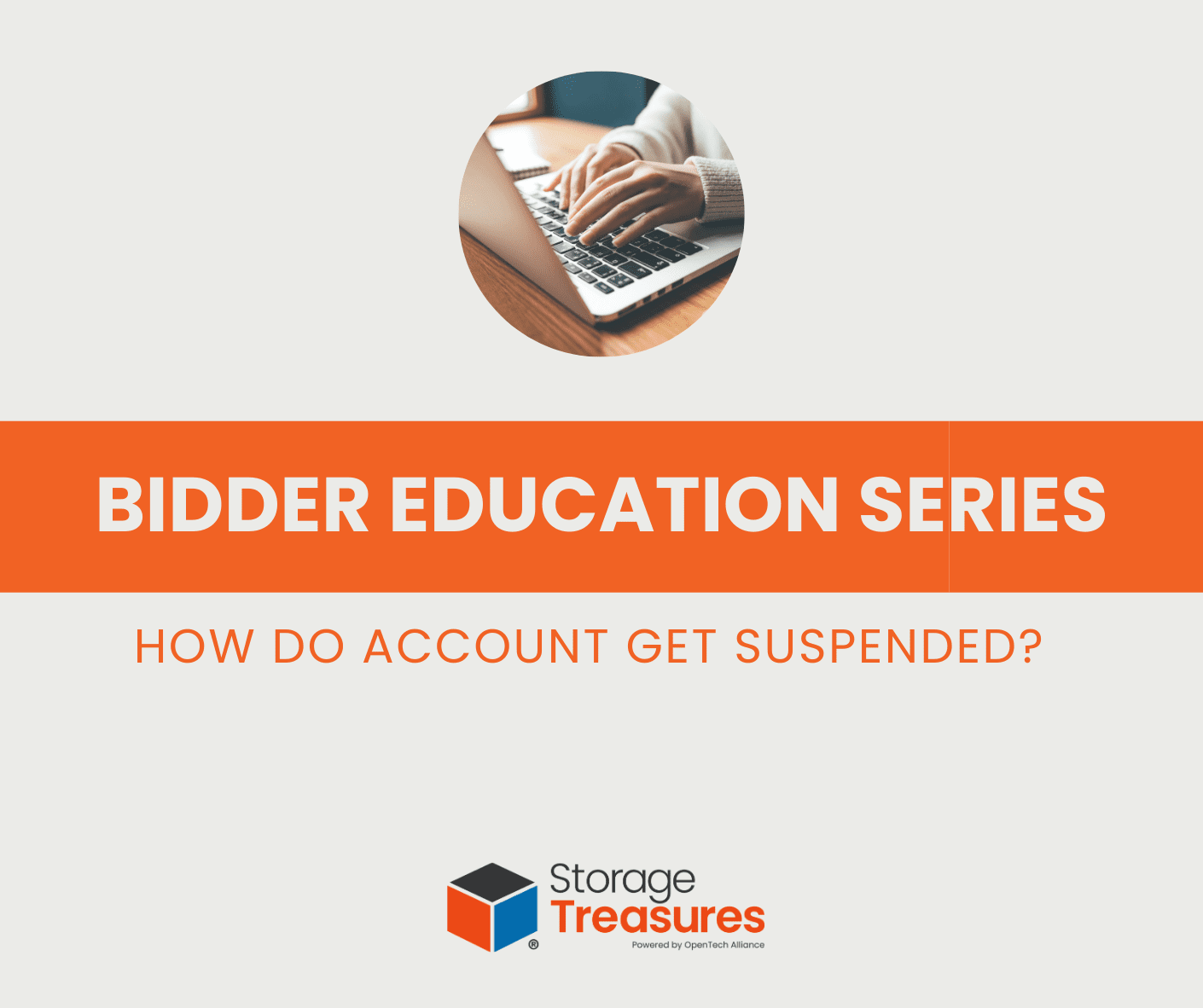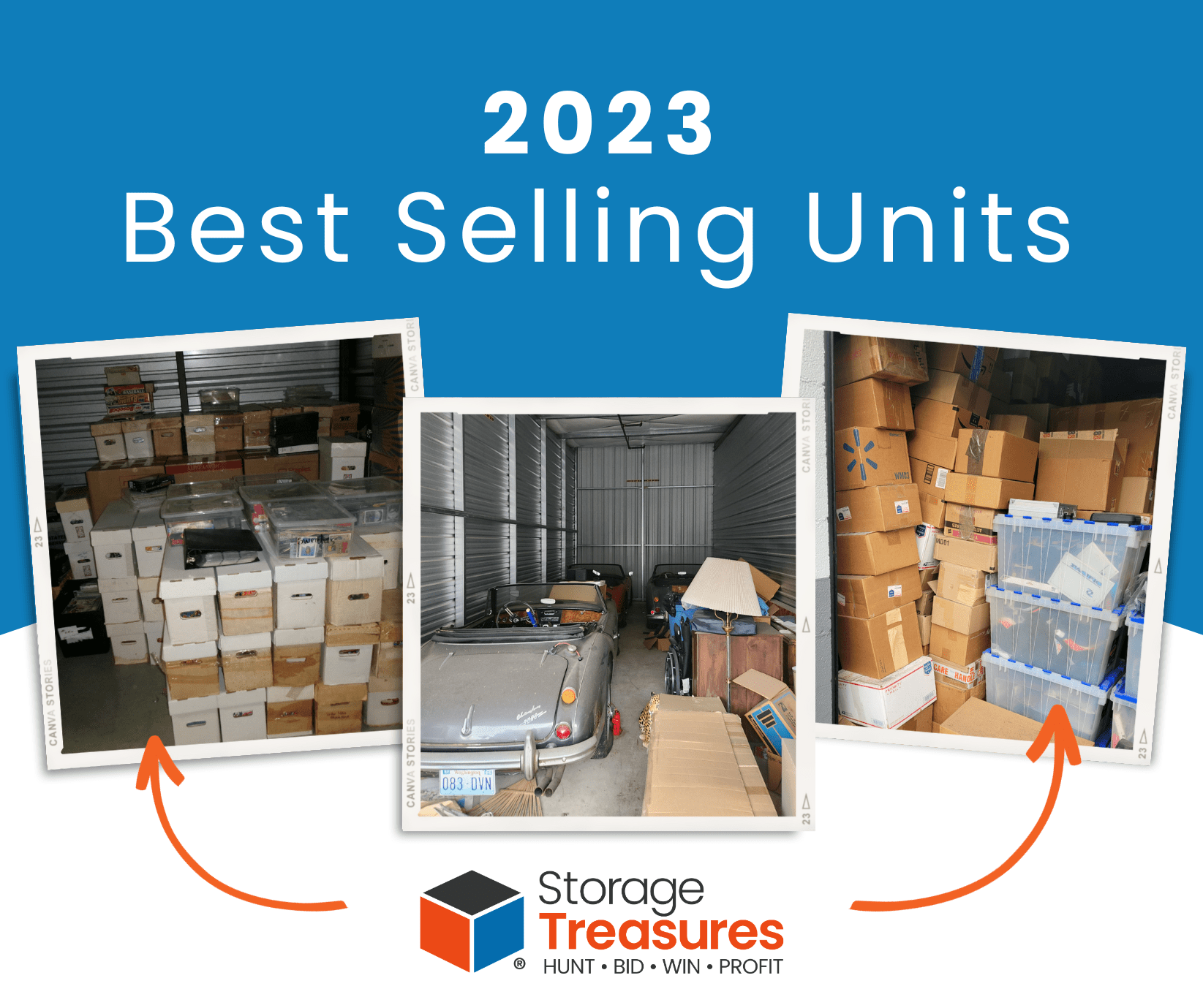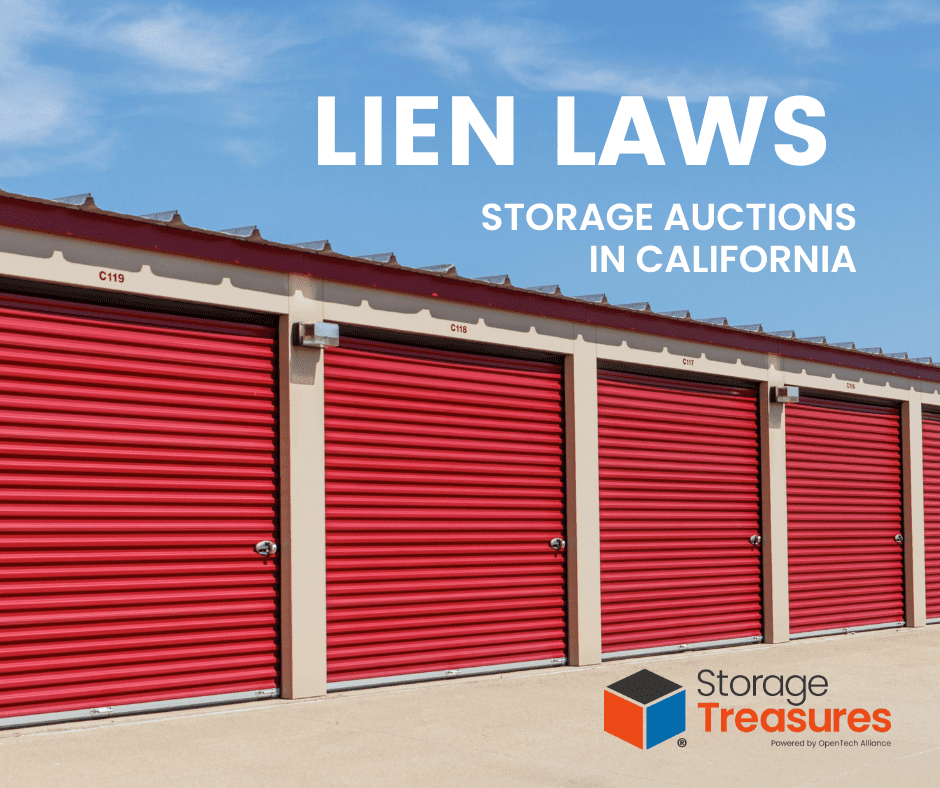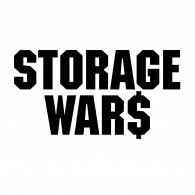StorageTreasures has recently noticed an influx of new bidders to our website. We field a ton of questions about how auctions work, so we thought this would be a great time to publish information to help new bidders learn about storage auctions. If you are new to storage auctions or thinking about buying a storage unit to resell, this article is for you!
The process seems easy and fun on TV and YouTube, but just like any other business, auctions require knowledge, preparation, and hard work. You can’t just decide to buy a unit, pick it up, and expect to make hundreds of dollars. It is essential to educate and prepare yourself if you want to get great units and make a profit. More importantly, this preparation will help keep you from losing money on units.
There are a ton of articles and videos on the internet about storage auctions. The content can be overwhelming, and it isn’t easy to know what to trust. There are also a lot of different features to the StorageTreasures website you might not know before you use the website. We want to help you be successful at the business of storage auctions and hopefully save you some unnecessary frustration. Our team put our heads together and came up with the things we think are most important for you to learn about buying storage units online.
Non-Lien Unit/Manager Special
There are different types of storage units StorageTreasures offers for sale. Not all units you see on the website are delinquent tenant units. We also have an option for a “Non-Lien Unit” or a “Manager Special.” Storage facilities often have a unit they keep open to gather items left around the property. Once the unit gets full, they will sell the contents as a Non-Lien Unit. These units might have a couch or a TV that was rejected by a previous tenant. These units can also be called a “Build-Up Unit,” or a “Company Unit.” These units can still have valuable items, but it is important to note they are not a traditional lien unit. If a storage locker is a Non-Lien unit, you will see the flag pictured below on the listing.

Private Sellers
Private Sellers are individuals who are not affiliated with a storage facility. They place items of their choosing into a storage unit they are renting and sell the unit as one lot. Private Seller units will be indicated by the same flag above for Non-Lien/Manager Special Units. You can always tell if a unit is being sold by a Private Seller because instead of seeing the name of a storage facility, the name of the seller will follow this format, “Private Seller – John G.”
If you purchase a unit from a Private Seller, you will not go to the storage facility office to pay. You will need to meet with the Private Seller personally. The storage facility will not be involved in the sale in any way.
Charity Storage Units
You might also run across a unit for Charity Storage. Charity Storage is an organization that works with StorageTreausres to sell units for charity. Self storage operators will choose a unit and collect donations to sell in one lot, and then the proceeds are sent to the charity of their choice. If you bid on a Charity Storage unit, the entire bid amount will be collected on the credit card you have on file with StorageTreasures. You will not be charged sales tax because the proceeds are for a non-profit organization, but you will need to be able to pay the full bid amount upfront. Below you will see the flag and explanation indicating a unit is a Charity unit.

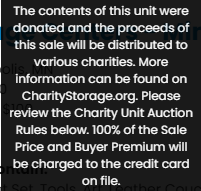
StorageTreasures Invoice
Our invoices often confuse new bidders. They are a little complicated. If you win a unit, StorageTreasures will collect a few things on your credit card.
- Buyer Premium – what you pay to use the StorageTreasures website
- Purchase Deposit – a deposit of 0-10% that will be subtracted from what you pay the facility
It might seem like you are paying double fees, but remember the Purchase Deposit will be deducted from the amount you owe at the facility. You are not paying it twice. You are only paying it early. Here is a link to an article in our Help Center to help you better understand an invoice.
Staged Units or Picked Through Units
Staged units or picked through units are one of the most common complaints we get from new bidders. Naturally, the first thought is the facility manager or someone working at the facility must have entered the unit and removed the valuable items. There are probably dishonest people in self storage, just as there are in every business. However, we ask you to consider a few things before jumping to that conclusion.
- Any “Lien Unit” for sale belongs to a tenant who did not pay their bill. The tenant has until the auction to pay their bill and reclaim their property. In an online auction, they have until the winning bidder takes possession of the unit to come and pay. Tenants are notorious for paying at the last minute. The manager knows if the tenant comes to pay, the unit has to be precisely as the tenant left it, with all items, or the facility could face a lawsuit. Managers cannot possibly know which tenants will pay at the last minute, so managers would put themselves in a difficult position if they did remove items.
- Winning bidders will get a Tamper Tag number on their winning invoice. It would be best if you always make sure the Tamper Tag matches when you go to pick up the unit. Confirming the tamper tag matches and is not broken means the unit has not been opened since the photos were taken.
- Tenants often know they are going to stop paying their bills, and they take the valuable items out before they lose access to the property. They get their essential items back, and they leave the mess for someone else to clean up.
- Storage facilities have no choice but to sell the unit as it is. We often hear people say, “it was all garbage; why didn’t they just throw it away?” Most likely because they can’t do that. A storage facility has to go through the sale process completely to get their unit back. The only time they can dispose of the items is if they are 100% certain there is NO COMMERCIAL value. Often, they cannot take that risk because they do not see everything in the unit. Operators are not legally required to open trunks, boxes, or totes to identify the items. They are not just trying to “unload their garbage” on you. They are following the law to the best of their ability.
Identifying the quality of units is something you need to work hard on and practice. You need to hone your craft to be able to locate bad units readily.
Pictures Don’t Match
Hopefully, this will happen to very few of you, but sometimes mistakes do happen. Managers can upload the wrong photos by mistake. The pictures you see online should always match the unit you see when you arrive at the facility. If they do not match, DO NOT GO INSIDE THE UNIT, DO NOT REMOVE ANYTHING FROM THE UNIT!! Tell the manager immediately you would like a refund because the pictures do not match. If you have difficulty in a situation involving pictures, reach out to StorageTreasures Customer Support for assistance. The most important thing to remember is not to remove anything from the unit. Once you take possession of the unit, it is much more challenging to get a refund.
Dirt, Rodents, and Spoiled Food
Unfortunately, this is going to happen. It might even happen more than you would think it would. Some storage units sit for years before non-payment and then auction. Every storage facility we have ever worked with tells tenants they are not allowed to store food or perishable items, but unfortunately, it still happens. Food storage can lead to rodents and rodent droppings. As mentioned earlier, storage operators legally have to sell the unit as they find it, or at least attempt to sell them.
Also, you will note in StorageTreasures Terms of Use, each unit is sold “as is, where is, no warranties, or guarantees.” Auctions, in general, are not known for allowing refunds, so it is tough to go back on a sale after you have entered the unit, even if it is disgusting.
Shill Bidding
Shill bidding, otherwise known as bidding on one’s own unit to drive the price higher, is prohibited by the StorageTreasures website. It is also a practice that is potentially illegal or could create a great deal of liability for the storage operator. A lot of new bidders feel some managers have an account where they bid to manipulate the price higher.
Shill bidding could be possible, but facility managers have to report to District Managers or Area Managers about the results of the auction. If a manager bids a unit up and wins, they will either need to buy the unit themselves or cancel the unit. If they cancel it, they will have to explain to their supervisor why the unit did not sell. Canceled and unsold units are watched very closely by storage operators, so bidding on their own units could potentially cost the managers a lot of money. Or even their job.
There are a handful of states in which shill bidding is entirely illegal. StorageTreasures cannot possibly police every single unit listed on our site. We need your help there. If you have a reason to believe shill bidding is occurring, please let our Customer Support team know right away, and we will investigate the issue.
Pictures
We get a lot of comments from bidders who would like to have more, clearer pictures. StorageTreasures wants this too. We want it so much. Pictures are uploaded at the facility based on the guidelines the managers have been given. Don’t forget, online auctions are still relatively new, and we have first time sellers on the website every month. StorageTreasures has spent the last few years gathering data so we can make educated best practice recommendations. A lot of operators do not realize how much photos impact unit price. We are spreading the word wide and far!
Fees and Cost of Using StorageTreasures
Many new bidders report they think our fees are too high. A bidder premium of 10-15% is consistent with industry standards. In-person auctions often charge a bidder premium of up to 30%. Many people are confused about how much they are paying because of the Purchase Deposit. They see the Purchase Deposit listed on the invoice, so they think they are paying 25% of the total price. Don’t forget that the Purchase Deposit amount is deducted from what is paid at the facility. Thus, the bidder really isn’t paying 25%.
StorageTreasures is a vast, active website. We could not possibly run and support the website if we didn’t have a team of people behind the scenes to help you with whatever comes up. While it might appear we don’t have a lot of overhead, we do.
There are many different pricing models in the industry. Some websites allow bidders to pay a subscription fee, and others charge by the auctions. It is important to note you can sign up for our Pro Membership to save 5% on your buyer premium. Click here to learn more information.
Hopefully, we have been able to condense some of the most common questions about StorageTreasures and online auctions in a way you can learn from them. If you have any other questions, we have a Help Center with hundreds of articles for you to look through. Click here to access our Help Center. To find out more the bad reviews storage auctions get, click on this article. To practice your craft and find great units, go to StorageTreasures.


